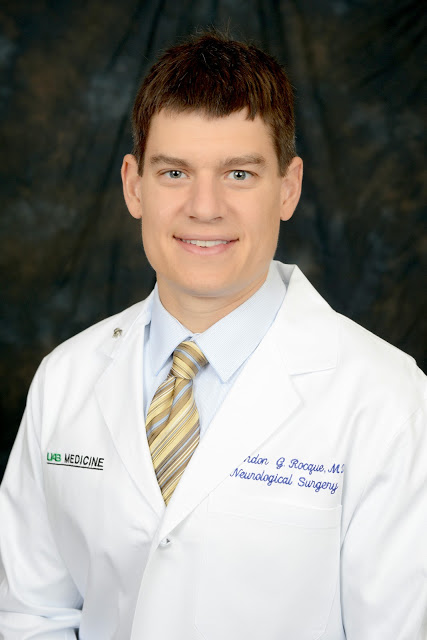 Brandon Rocque, MD, MS is a pediatric neurosurgeon at UAB who had some experience applying for a K award before he heard about the CCTS KL2 opportunity. He had applied twice before to the PCOR K12. This application, he says, was "very straightforward and fit my research aims well."
Brandon Rocque, MD, MS is a pediatric neurosurgeon at UAB who had some experience applying for a K award before he heard about the CCTS KL2 opportunity. He had applied twice before to the PCOR K12. This application, he says, was "very straightforward and fit my research aims well."
Those aims seem simple but haven't yet been implemented at UAB. Rocque's project proposes to create an intervention for pediatric neurosurgery patients in the hospital setting.
The title of his project is, "Psychosocial risk and distress in families of newly diagnosed pediatric brain tumor patients."
"I'm often the first point of contact for patients with brain tumors, and this is a very distressing time for them and for their parents," he says. "We have a very well established, well-run network of psychosocial support in the oncology clinic. However, we don't have that in the hospital, where I'm involved."
Hospitalization and surgery often follows swiftly on the heels of a diagnosis in these patients, and Rocque's idea is to try to quantify the stress of this situation, and identify psychosocial interventions. He plans to interview families who have been through similar situations, and then design tailored interventions.
"Once your child has an established diagnosis of cancer or something like it," Rocque explains, "there are all types of resources available. We don't have that for inpatients, in the hospital, where I'm involved. We find a mass; the family meets with a neurosurgeon, has an operation, and then they stay in the hospital a week or two for recovery."
The interventions he envisions designing, he says, could likely be scaled to other institutions. "For example, pediatric neurosurgeons in Jackson, Mississippi, could use the same protocols. I'd hope this would be applicable to any child in an acute situation-trauma, newborn, et cetera."
The project, Rocque says, requires a good deal of qualitative work, in terms of interviews and focus groups, followed by developing ways to measure pediatric stress. For the latter, Rocque has worked a mini-sabbatical into his KL2 plan, which includes travel to Delaware to work with a pediatric team who designed a psychosocial assessment tool.
"I'm hopeful that this grant will allow the development of hospital protocols that will improve family support for a wide range of children."